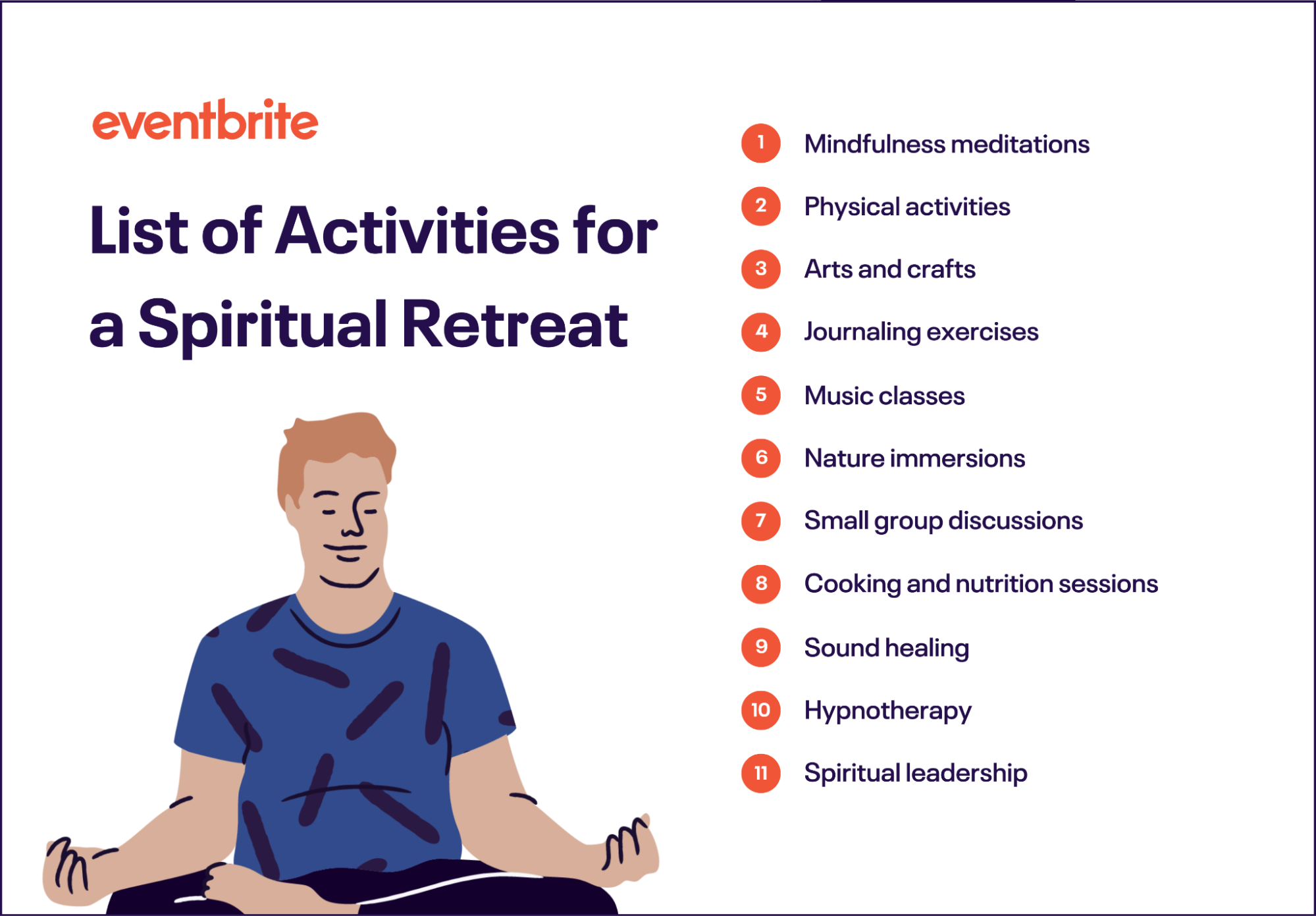Spiritual retreats are important for personal growth and mental well-being. They offer a break from daily stress and routine.
Spiritual retreats provide a sanctuary for the mind, body, and soul. These retreats allow individuals to disconnect from their hectic lives and immerse themselves in a peaceful environment. Participants often engage in meditation, yoga, and reflective practices that foster inner peace.
This time away helps in reducing stress, enhancing mental clarity, and promoting emotional healing. By focusing on self-awareness and mindfulness, retreats help people reconnect with their true selves. Attendees return to their daily lives feeling rejuvenated, balanced, and more centered. Spiritual retreats are essential for maintaining overall mental and emotional health.
The Quest For Inner Peace
Many people seek inner peace to escape daily chaos. Spiritual retreats offer a sanctuary to achieve this goal. They provide a break from the fast-paced world.
Modern Life And Stress
Modern life comes with various stressors. Work pressure, family responsibilities, and social obligations can be overwhelming. These factors lead to mental and emotional fatigue.
Stress affects both the mind and body. It can lead to anxiety, depression, and physical ailments. A spiritual retreat allows one to disconnect from these stressors.
The Role Of Stillness
Stillness plays a crucial role in finding inner peace. It allows the mind to rest and rejuvenate. During a spiritual retreat, participants engage in meditation and mindfulness practices.
These practices help to quiet the mind. They also promote self-awareness and clarity. A calm mind can better handle life’s challenges.
| Benefits of Stillness | Explanation |
|---|---|
| Mental Clarity | Reduces mental clutter and enhances focus. |
| Emotional Balance | Regulates emotions and promotes well-being. |
| Physical Health | Reduces stress-related ailments. |
Spiritual retreats offer a structured environment for stillness. This structure helps participants maintain a disciplined practice. The benefits extend long after the retreat ends.
- Improved mental health
- Enhanced emotional stability
- Greater physical well-being
These are just a few reasons why spiritual retreats are important. They provide a path to inner peace and overall wellness.
Defining Spiritual Retreats
Spiritual retreats are more than just a time away from routine life. They offer a chance to connect deeply with oneself and the universe. These retreats focus on mental, emotional, and spiritual growth. Participants engage in activities like meditation, yoga, and mindful practices.
In these retreats, people explore their inner selves. They gain insights and find peace. Many return feeling refreshed and more aligned with their purpose.
More Than Just A Vacation
Unlike a typical vacation, a spiritual retreat has a deeper purpose. It’s not about sightseeing or relaxation alone. It’s about healing and transformation. Participants often have a structured schedule. This includes sessions for meditation, reflection, and learning.
These retreats provide a supportive environment. People can share their experiences and learn from others. They can also disconnect from the digital world and focus on their inner journey.
A Journey Inward
Spiritual retreats encourage participants to look within. This journey inward helps them understand their true selves. People often come face-to-face with their fears and desires. They learn to accept and embrace themselves fully.
This self-awareness leads to personal growth. Participants find clarity and direction in their lives. They return with a renewed sense of purpose and peace.
Historical Roots Of Retreats
Spiritual retreats have deep roots in history. These gatherings have evolved over centuries. They offer a space for reflection and growth. Understanding their origin helps appreciate their value today.
Ancient Practices
Ancient civilizations valued retreats. In India, sages and monks retreated to forests. They sought solitude for meditation and prayer. Ancient Greece had similar traditions. Philosophers like Pythagoras and Plato encouraged retreats for deeper thinking. These practices aimed to connect with the divine and find inner peace.
In ancient Egypt, priests would retreat to temples. They engaged in rituals and contemplation. The goal was to seek wisdom and divine guidance. These early retreats were the foundation of today’s spiritual practices.
Evolution Over Centuries
Over centuries, retreats evolved. During the Middle Ages, Christian monks retreated to monasteries. They focused on prayer, work, and study. These retreats were structured and disciplined.
In the East, Buddhist monasteries became popular retreat centers. Monks practiced meditation and mindfulness. These retreats influenced many spiritual traditions worldwide.
In the modern era, spiritual retreats have diversified. They now cater to various beliefs and practices. From yoga retreats in India to silent retreats in Europe, the essence remains the same. They offer a break from daily life to reconnect with oneself.
Here is a table summarizing the evolution of retreats:
| Era | Region | Purpose |
|---|---|---|
| Ancient | India, Greece, Egypt | Meditation, Prayer, Wisdom |
| Middle Ages | Europe | Prayer, Work, Study |
| Modern | Global | Diverse Practices |
Spiritual retreats have a rich history. They continue to be a source of peace and enlightenment. Understanding their roots helps us value their importance today.

Credit: www.pinterest.com
Types Of Spiritual Retreats
Spiritual retreats provide a much-needed break from our daily routines. These retreats offer a chance to reconnect with our inner selves. There are several types of spiritual retreats, each serving a unique purpose.
Silent Retreats
Silent retreats focus on complete silence. Participants spend their time in quiet reflection. The goal is to quiet the mind and listen to the inner voice. These retreats help reduce stress and promote mental clarity. They are perfect for those who need a break from constant noise.
Nature Immersions
Nature immersions take place in natural settings. Participants connect with the earth and its beauty. Activities may include hiking, meditation, and yoga in nature. These retreats help people feel grounded and rejuvenated. They are ideal for those who love the outdoors.
Religious Pilgrimages
Religious pilgrimages involve traveling to sacred sites. Pilgrims seek spiritual growth and deeper faith. These journeys often include prayers, rituals, and community gatherings. Pilgrimages offer a sense of belonging and spiritual fulfillment. They are great for those seeking a deeper connection with their faith.
| Type of Retreat | Main Focus | Ideal For |
|---|---|---|
| Silent Retreats | Quiet reflection and mental clarity | Those needing a break from noise |
| Nature Immersions | Connecting with nature and feeling grounded | Outdoor enthusiasts |
| Religious Pilgrimages | Spiritual growth and deeper faith | Faith seekers |
Benefits For Mind And Body
Spiritual retreats offer numerous advantages for both mental and physical well-being. They create a serene environment to help individuals disconnect from daily stress and find inner peace. Below are some key benefits of spiritual retreats for the mind and body.
Mental Clarity
Spiritual retreats provide a quiet space, free from distractions. This helps in achieving mental clarity and focus. When the mind is calm, it becomes easier to think clearly and make better decisions.
Many retreats offer meditation and mindfulness practices. These practices help in reducing mental clutter and enhancing concentration. Participants often report feeling a sense of peace and mental relaxation.
Regular participation in spiritual retreats can improve emotional balance. This helps in managing stress and anxiety more effectively.
Physical Rejuvenation
Spiritual retreats often include activities that promote physical health. Yoga sessions, nature walks, and healthy meals are common features. These activities contribute to overall physical rejuvenation.
Engaging in regular physical activities during the retreat helps in boosting energy levels. It also improves body flexibility and strength.
Healthy eating habits promoted during the retreat can lead to better nutrition. This helps in detoxifying the body and improving digestion.
Summary Of Benefits
| Benefit | Mind | Body |
|---|---|---|
| Mental Clarity | Reduced stress | Improved concentration |
| Physical Rejuvenation | Better emotional balance | Boosted energy |

Credit: www.amazon.com
Spiritual Growth And Self-discovery
Spiritual retreats offer a profound opportunity for spiritual growth and self-discovery. They provide a serene environment, free from daily distractions. This allows individuals to delve deep into their inner selves and understand their true essence.
Unlocking Personal Insights
During a spiritual retreat, participants engage in various activities like meditation, yoga, and prayer. These activities help in unlocking personal insights and understanding one’s purpose in life. The serene environment encourages introspection, leading to meaningful revelations.
Participants often experience a heightened sense of awareness. This awareness helps them identify and address inner conflicts. This process is essential for personal growth and healing.
- Engage in meditation
- Practice yoga
- Participate in prayer sessions
Fostering Mindfulness
Mindfulness is a key aspect of spiritual retreats. It involves being present in the moment and fully experiencing it. This practice helps in reducing stress and enhancing mental clarity.
Retreats offer guided sessions on mindfulness techniques. These sessions teach participants how to focus on their breath, thoughts, and emotions without judgment. This leads to a calmer and more centered mind.
| Mindfulness Techniques | Benefits |
|---|---|
| Breathing Exercises | Reduces anxiety |
| Body Scanning | Enhances body awareness |
| Guided Meditation | Improves concentration |
Spiritual retreats foster a sense of community. Participants share experiences and support each other. This communal aspect helps in building a strong support system.
Community And Connection
Spiritual retreats are more than just a break from daily life. They offer an opportunity to build strong bonds with like-minded individuals. This sense of community and connection plays a crucial role in personal growth and emotional well-being.
Shared Experiences
During a retreat, participants engage in shared activities like meditation, yoga, and group discussions. These shared experiences foster a sense of unity and understanding among participants. They create memories that last a lifetime.
Consider the following activities that are often shared during a retreat:
- Meditation sessions
- Group yoga classes
- Nature walks
- Mindfulness exercises
- Storytelling sessions
These activities help individuals connect on a deeper level. They experience a sense of belonging that is hard to find in daily life.
Sense Of Belonging
Being part of a community where everyone shares the same goals creates a strong sense of belonging. This feeling is essential for emotional well-being and personal growth.
Let’s look at some elements that contribute to this sense of belonging:
| Element | Description |
|---|---|
| Supportive Environment | Participants feel supported and understood by others. |
| Shared Goals | Everyone works towards similar spiritual or personal development goals. |
| Open Communication | Honest and open conversations build trust and relationships. |
These elements ensure that everyone feels valued and accepted. This, in turn, boosts confidence and encourages personal growth.

Credit: www.eventbrite.com
Integrating The Retreat Experience
A spiritual retreat offers a profound escape from daily life. It provides an opportunity to refresh the mind, body, and soul. Integrating this experience back into everyday life is vital. This ensures the benefits of the retreat last longer than the retreat itself.
Carrying Peace Into Daily Life
It’s essential to carry the peace found during the retreat into daily routines. This can be done through simple practices:
- Meditation: Start the day with a few minutes of meditation. This helps center the mind.
- Mindful Breathing: Take deep breaths during stressful moments. It calms the mind.
- Positive Affirmations: Repeat positive affirmations to maintain a peaceful mindset.
These practices ensure the tranquility experienced during the retreat stays with you.
Long-term Impact On Well-being
The long-term impact on well-being is significant. The benefits of spiritual retreats extend beyond immediate relaxation. They foster enduring positive changes:
- Improved Mental Health: Regular retreats can reduce anxiety and depression.
- Enhanced Physical Health: Stress reduction leads to better overall health.
- Strengthened Relationships: A calm mind improves relationships with others.
A spiritual retreat is a powerful tool for long-term well-being. Integrating the retreat experience into daily life magnifies these benefits.
Frequently Asked Questions
What Is The Purpose Of A Spiritual Retreat?
A spiritual retreat aims to provide a peaceful environment for personal reflection, inner healing, and spiritual growth. Participants disconnect from daily stress to reconnect with their inner selves and deepen their spiritual practice.
What Is The Importance Of A Retreat?
A retreat provides relaxation, reduces stress, and enhances mental well-being. It fosters personal growth, creativity, and self-reflection.
What Is The Value Of A Retreat?
A retreat offers relaxation, reflection, and rejuvenation. It enhances mental clarity, reduces stress, and boosts creativity. Ideal for personal growth and connection.
Are Spiritual Retreats Worth It?
Yes, spiritual retreats are worth it. They offer relaxation, self-discovery, and stress relief. Participants often experience mental clarity and emotional healing.
Conclusion
Spiritual retreats offer a vital escape from daily stress. They help rejuvenate the mind and soul. Participants gain clarity, peace, and renewed purpose. These retreats foster personal growth and deeper connections. Investing time in a spiritual retreat can greatly enhance overall well-being.
Prioritize your inner peace and growth through these enriching experiences.





